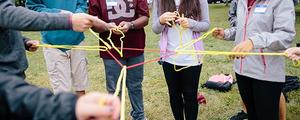Story Highlights
- Poor mental health and loneliness are on the rise
- Higher education institutions can be a catalyst for change
- A foundation of wellbeing can advance student and societal outcomes
If it's true that one important indicator of a flourishing society is a healthy workforce, which is dependent upon healthy individuals, wellbeing matters tremendously -- not only for the health of young people but also for the future wellbeing of our society. If it's also true that the most prolific workforce generators are our institutions of higher education, then we have an opportunity like never before to give college students the skills to create a new reality.
Yet, that new reality begins with a tremendous challenge. Global healthcare company Cigna conducted a national study of more than 20,000 U.S. adults to explore the impact of loneliness among different generations. Not only did almost half of Americans report feeling alone or left out, but Generation Z -- those born in 1997 or later -- scored highest for loneliness.
In addition, since 2001, Gallup has asked Americans as part of its November Health and Healthcare survey to say whether their own mental or emotional wellbeing is excellent, good, only fair or poor. Americans' latest assessment of their mental health is worse than it has been at any point in the last two decades. U.S. adults aged 18 to 29 rating their mental health as "excellent" shifted from 37% in 2019 to 28% in 2020, representing a nine-percentage-point drop and the lowest figure among any age group.
2020 brought solitude and loneliness like never before -- it was the kind of year that reminded us why former U.S. Surgeon General Vivek Murthy once declared poor emotional wellbeing and loneliness a public health crisis.
Yet, a daunting challenge can't delay the choice to act. Crisis often precedes development, yielding unique opportunities. And now, more than ever before, higher education has been given the opportunity for a new beginning. The task at hand is acknowledging "what is" and dreaming about "what could be." It's time for higher education to lead a cultural transformation with wellbeing as the foundation for advancing the outcomes we desire, for not only our students but also our world. Gallup research shows that graduates who were emotionally supported during college -- who had a mentor who encouraged their hopes and dreams and professors who cared about them as people and made them excited about learning -- are three times as likely to have thriving wellbeing after college.
It's time for higher education to lead a cultural transformation with wellbeing as the foundation for advancing the outcomes we desire, for not only our students but also our world.
Clarifying what we mean by "wellbeing" seems fundamental. Asking students sincere questions that measure their wellbeing across five interrelated elements (career, social, financial, community and physical) provides us with a snapshot of their current state of being and how well they are feeling cared for (or not) on campus. These kinds of questions exhibit authentic caring and provide us with a platform for tremendous change ... a model that has been implemented at Virginia Tech.*
The more we look below the surface of our students' lens on life, the more we are learning about factors that may be contributing to eroding wellbeing and mental health.
To be catalysts for meaningful change, however, institutional leaders must find the courage to embrace new ways of thinking, unearth assumptions that feed the status quo and act accordingly. As renowned organizational systems theorist Peter Senge says, "A small action snowballs." That is, small changes build on themselves and can produce big results, and many high-impact interventions are often the least obvious.
Gallup Senior Scientist Shane Lopez had another name for those small changes: hope. Hope gets unleashed through small actions -- what Dr. Lopez called "tiny ripples."
He put it this way: "You don't have to take a big, bold action or raise a ton of money to spark change. You merely need to create momentum where there was none."
The continued erosion of wellbeing doesn't have to be our future. We can be honest about where we are and simultaneously pivot the conversation from problems to possibilities. The conditions are ripe for colleges and universities to step in and do what we do best: Shift culture, bolster hope and design experiences -- both curricular and co-curricular -- that turn humans toward one another and our collective flourishing. This is our time to remake our culture, to design infrastructures that engage students in relationship building, in finding wellbeing and in building a reservoir of empathetic concern for others. We can do this -- it's time to steer ourselves back on course.
*Using a strengths-based approach and Gallup's wellbeing model, Virginia Tech has added almost 20 clinicians and innumerable programmatic initiatives to support mental health in the past five years. The Princeton Review recently released the 2021 edition of its annual "The Best 386 Colleges" with a new category -- Best Counseling Services, highlighting "colleges at which students most highly rated their school's mental health counseling services." Virginia Tech's was ranked No. 1.
Learn more about Gallup's research on wellbeing and how we can help support thriving students and educators:
- Explore our online resource: How to Improve Student and Educator Wellbeing.
- Discover how a CliftonStrengths for Students initiative can empower students to live thriving and engaged lives at school and after graduation.
- Partner with us to prepare students for whatever the future holds.





